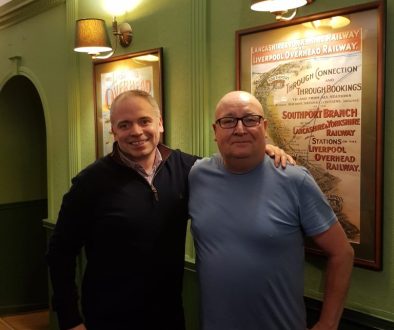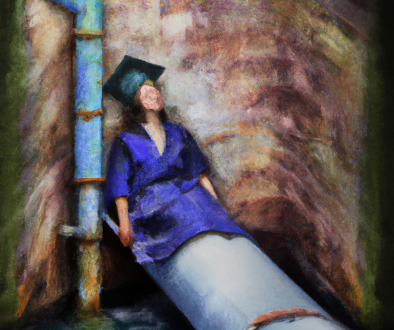Education for Everyone by Elizabeth Vasileva
I remember the excitement when I completed my PhD. The final push of the last six months. The preparation for a viva voce. The relief when told, ‘Congratulations, you are a doctor!’ I don’t think I was young and naïve then but I certainly did not expect the walls I encountered trying to find my place in academia post-PhD. I thought I was in, but academia thought I was only just starting out on the endless path of churning out articles, competing for REF and TEF, taking up unpaid responsibilities, and everything else which might ultimately result in a secure position in a university – and an income above minimum wage. Do these jobs even exist any more?
Two years and a number of precarious teaching contracts later, I have not managed to find that security. It seems more mysterious and elusive than the fabled Fata Morgana. Instead, what I’ve seen are the ways in which the system is rigged against working class, female, foreign, queer, black, brown … essentially anyone who isn’t white, male and middle class. That’s academics, students and support staff. Students struggling to understand why they pay £9000 worth of fees for four contact hours a week, tutors struggling to survive on £40 a week for the one class they are employed to teach, support staff struggling to keep their jobs as another vice chancellor decides to redirect their salaries into another unnecessary, flashy new building. What does that mean for education? How can education happen in this environment, even for the privileged who make it there? The French philosopher Gilles Deleuze wrote this about the situation in the 1980s:
What now seems problematic is the situation in which young philosophers, but also all young writers who’re involved in creating something, find themselves. They face the threat of being stifled from the outset. It’s become very difficult to do any work, because a whole system of “acculturation” and anticreativity specific to the developed nations is taking shape. It’s far worse than censorship.[1]
Deleuze refers here to the French academy in the generation after his own, where, he felt, philosophy and academia were blocked by a reactionary economic and political force and where more and more rules were being put in place to compel philosophers and theorists to conform. Looking at Britain in 2020, the situation does not seem very different – the turn towards commodification of knowledge and privatisation of universities seems more or less complete, with humanities and arts degrees a primary target of cuts because of their failure to produce easily quantifiable results. The current expectations around producing knowledge in the form of articles, books, conference presentations etc. and disseminating that knowledge to students are subordinated more and more to a market logic. As one might expect, the ‘knowledge’ that is produced is also closely monitored and curated, most often by other academics through a system of peer-reviewed journals resulting in “an orthodoxy of research that is so disciplined, so normalized, so centered . . . that is has become conventional, reductionist, hegemonic, and sometimes oppressive and has lost its radical possibilities.”[2] It is not surprising then that the proliferation of written information in the form of textbooks, articles, chapters, blogs, etc. heaps up so quickly that new students are often left discouraged and frustrated in their attempts to navigate the field. At the same time, we rarely see a break from the established knowledge and methodologies of academic writing and attempts to question this framework or create the opportunity for something different are ‘stifled’, as Deleuze put it.
This is even more difficult for working class, black, brown, female and queer bodies within academia. To such people, the promise of university education can at first seem inherently valuable with promises of social mobility and jobs prospects. Instead, we are faced with a constant imperative to ‘blend in’, to ‘fit’ with the homogenous make-up of the academic body, among people who often haven’t even considered the value of university as we do. What we do, and what we spend a huge amount on energy and heartache on, is utilising our position to resist and question these practices, to support others who find themselves on the same lonely island. I found myself oscillating between the two and suffered so much mental and emotional exhaustion as a result that I have many times considered giving up entirely, despite great success with my work and research. On one hand, I couldn’t easily fit in and felt like an impostor. On the other, I found myself often alone or not daring to do anything that would risk me losing my precarious contract. I was not being myself, and I was failing to give appropriate support to the students who were facing similar difficulties. The feeling of powerlessness became so deep I was not sure I saw any value in university education or academia at all. I couldn’t attribute some sort of abstract transcendent ‘good’ to education, given the form it had, or even find much to give me a reason to believe the current system can be fixed (or even improved).
What kept me from losing hope in education was the Free University Brighton. Part of the project since it started six years ago, I have seen that other kinds of education is possible. I cannot honestly make sense why or how this project works, but we have more than five hundred registered students of different ages and strengths, different ‘departments’ and a bunch of university academics teaching for free. In fact, no money exchanges hands in any way. The use of physical space was offered to us for free, the tutors teach for free, and the students don’t pay anything. Moreover, the project has been so successful that last year a different group of people started the Free University London, based in Bermondsey. I attribute part of that success to the removal of a monetarised relationship. The fact that everything is free not only reduces the material barriers for poor communities (though they still exist in the form of paying for travel, needing child care or having free time to dedicate to studying), it also creates a relationship of mutual understanding and trust between the students and tutors. Students don’t come because they are told they need to go to university to get a job and at the same time, tutors don’t recite Wikipedia webpages to cover what has been deemed the ‘essential’ curriculum to fulfil their job description.
Leaving the money question aside, what astonishes me is the range of reasons our students come. A recent survey of my classroom produced the following responses: “I am interested to know more about politics”; “I want to know about politics because I want to be able to argue against my Tory friends”; “The choice was to come to the class or go to the pub, so I decided to come to the class.” Their reasons for coming were as varied as I imagine our reasons are for teaching, yet the learning environment in the classroom is the most positive and productive one I have ever witnessed. It challenges tutors to make education different, to remove the barrier between the ‘keeper and disseminator of knowledge’ and the ‘empty vessel’ that is the student mind. For instance, we do not create standardised tests for our students. We do not present education as a neat little package that can be delivered to the students in manageable portions and will get them a secure, lifelong job afterwards. We do education collaboratively – they suggest what they want to learn, we suggest what we want to teach. We discuss all the murky debates philosophers haven’t been able to solve without pretending we know all the answers. We call out uncritical thinking when we see it. No sugar-coating, no learning to get a job, no end goal to the process. We just enjoy doing it. And now we have a community where people support each other, thirst after learning, feel empowered to use that knowledge out in the world (imagine if undergrad students were so thrilled by a class that next year they came back to teach a class of their own, drawing confidently on their own learning and experiences!) and have created a small transformed space outside the structures that govern traditional university education.
To find out more about the Free University Brighton, check out their website here.
To find out more about the Free University London, check out their website here.
We always welcome new tutors and new students, no previous knowledge or university education required to attend. You don’t need to pass any tests or bring proof, just show up to the class. We are committed to finding ways to support all of our students. We are also taking action regularly to address gender inequalities and to decolonise our space and classes through centering the voices of queer, trans and black people and people of colour, incorporating a diverse curriculum, and materially supporting people through providing entirely free education.
[1] Deleuze, Negotiations, 2nd edn, Columbia University Press, New York, 1995, p. 27.
[2] E. A St. Pierre, ‘Post qualitative research: The critique and the coming after’, in N. K. Denzin & Y. S. Lincoln eds, The Sage handbook of qualitative research, 4th edn, Sage, Thousand Oaks CA, 2011, cited in D. Bright and E. Honan, ‘Writing a Thesis Differently’, International Journal of Qualitative Studies in Education, vol. 29, no. 5, 2016, p. 732.

